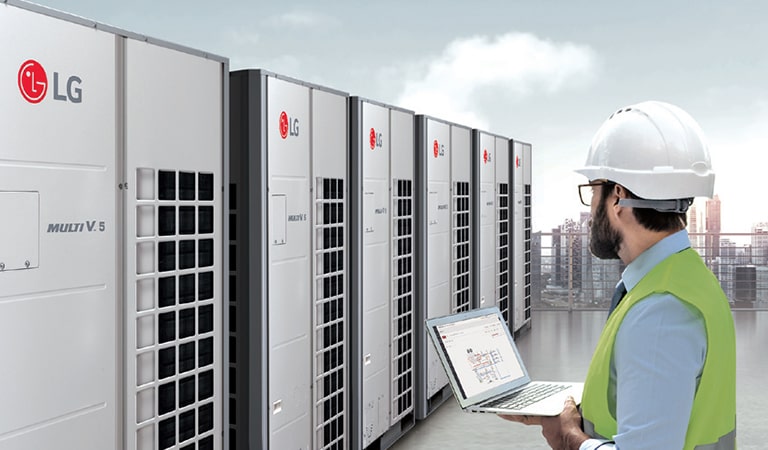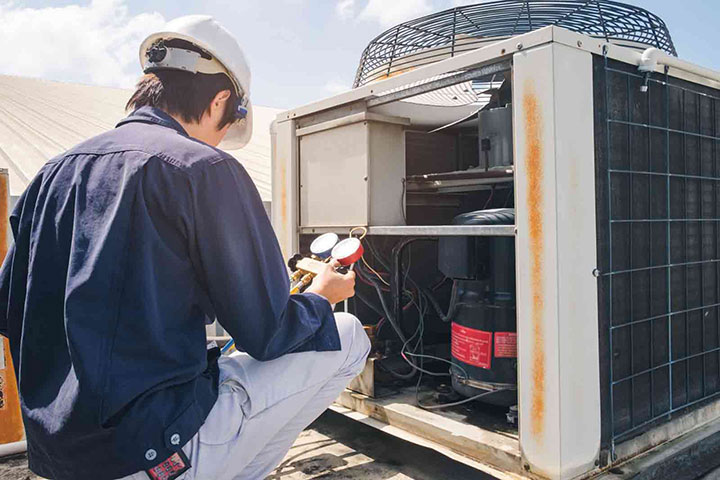Top Approaches for Maximizing Comfort with ductless mini splits
Top Approaches for Maximizing Comfort with ductless mini splits
Blog Article
Selecting Between a Heatpump and Heater: Trick Considerations for Your Cooling And Heating Needs
When examining home heating alternatives for a/c needs, the decision in between a heatpump and a heating system can be intricate. Each system offers distinctive benefits customized to specific climates and energy effectiveness goals. Understanding these distinctions is necessary for making an enlightened option. Secret elements such as installation prices and ecological impact further complicate the option process. Which option really straightens with one's convenience and sustainability choices? The following areas will check out these considerations in information.
Comprehending Warm Pumps: How They Function and Their Advantages
While many property owners think about different home heating choices, recognizing how warm pumps function and their benefits can considerably affect their choice. Heatpump operate by moving heat as opposed to creating it. In the winter, they remove heat from the outdoors air or ground and transfer it inside, while in the summer, they reverse this process, cooling down the home by removing warm outside. This dual performance makes them functional for year-round environment control.One of the primary advantages of warmth pumps is their power performance. They make use of substantially much less electrical energy compared to traditional heater, potentially leading to lower energy costs (heat pump service). Additionally, warmth pumps have a smaller carbon footprint, making them an ecologically friendly option. They also need less upkeep than conventional systems, adding to long-term expense financial savings. Generally, understanding the technicians and advantages of warmth pumps can assist property owners make educated choices concerning their home heating and cooling down needs
Checking Out Heaters: Types, Operation, and Advantages
Furnaces can be found in various kinds, consisting of gas, electrical, and oil versions, each with distinct functional devices. Comprehending these distinctions is essential, as they influence effectiveness and heating efficiency. Additionally, heating systems offer numerous advantages, such as regular warm result and integrity in colder climates.
Kinds of Heaters
Furnace can differ significantly in style and procedure, with heaters being a preferred choice amongst homeowners. There are a number of kinds of furnaces, each using different fuel sources and modern technologies. Gas heating systems prevail, leveraging natural gas to create warm efficiently. Electric furnaces, on the various other hand, utilize electrical resistance to create heat, often preferred for their simple installment. Oil furnaces, while much less typical, work in areas with limited gas access (heat pump replacement ooltewah tn). In addition, condensing furnaces make best use of power performance by capturing and reusing exhaust gases. Each type operates with a system of heat exchangers and ductwork to disperse cozy air throughout a home. Recognizing the distinctions in between these furnace types is crucial for educated cooling and heating choices
Benefits of Heaters
For homeowners looking for trusted heat during cool months, the benefits of furnaces are considerable. Furnaces supply regular heating, making sure even temperatures throughout the home. They are especially reliable in extreme cold, often outperforming heatpump in frigid problems. Numerous kinds, including gas, electrical, and oil heaters, use adaptability to meet varied needs and preferences.Furnaces additionally have a tendency to have lower first installation expenses compared to heat pumps, making them a more easily accessible choice for numerous. Their durable layout adds to a longer lifespan, with many units lasting over 15 years with appropriate maintenance. Furthermore, contemporary furnaces are usually equipped with advanced innovation for improved efficiency, which can result in lowered power costs. Generally, heating systems remain a reliable option for reliable home heating.

Power Effectiveness: Contrasting Warm Pumps and Furnaces
When contrasting power efficiency in between heat pumps and furnaces, the Seasonal Power Performance Proportion (SEER) plays a necessary duty in figuring out efficiency. Furthermore, an operational expense analysis exposes the long-term monetary effects of each system. Comprehending these variables can guide home owners in making informed choices concerning their heating services.
Seasonal Power Effectiveness Proportion
Energy effectiveness plays a vital duty in the decision-making procedure between warmth pumps and heating systems, especially when taking into consideration the Seasonal Energy Efficiency Proportion (SEER) This statistics steps the cooling effectiveness of warm pumps over a whole air conditioning season, providing a standardized way to examine efficiency. Greater SEER rankings indicate higher energy effectiveness, translating to lower energy consumption and reduced energy expenses. On the other hand, heating systems are usually examined using the Yearly Gas Utilization Performance (AFUE) ranking, which mirrors home heating effectiveness. When comparing these 2 systems, homeowners must focus on SEER scores for warm pumps, as they straight impact overall energy cost savings and ecological sustainability. A complete understanding of SEER can notably affect the long-lasting satisfaction and cost-effectiveness of the chosen HVAC option.
Functional Cost Analysis
Understanding the operational prices connected with heat pumps and heating systems is crucial for house owners assessing their alternatives. Heat pumps generally provide greater energy performance, converting electrical energy into warm with marginal waste. This causes reduced month-to-month utility costs, particularly in modest environments. Alternatively, traditional heating systems, especially gas designs, may have lower in advance costs however can sustain greater functional costs with time as a result of fuel rates and efficiency ratings.Moreover, heatpump can operate as both heating and cooling systems, possibly reducing the demand for separate cooling and heating devices. While initial financial investments for heatpump might be higher, their lasting savings in energy performance can make them an extra affordable option for several houses. Careful evaluation of local power check my source rates is vital to identify the most effective option.
Installation Prices: What to Expect for each and every Furnace
Installment costs for home heating systems can differ considerably in between heat pumps and heating systems, influencing property owners' choices. Heatpump normally have higher upfront installation prices, usually ranging from $3,500 to $8,000, relying on the device dimension and complexity of installation. This includes the outside unit, indoor handling system, and essential ductwork modifications. Conversely, furnaces often tend to have reduced initial prices, averaging in between $2,500 and $6,000, which can be appealing for budget-conscious property owners. Installment expenses can boost if extensive ductwork is required.Moreover, the option of fuel type for heating systems-- natural gas, lp, or electric-- can also influence installation costs. While heatpump provide energy effectiveness, their first investment may hinder some purchasers. Inevitably, assessing installment costs alongside lasting savings and performance will certainly assist property owners in making informed decisions regarding their heating unit.
Climate Considerations: Which System Carries Out Better in Your Area
How do climate problems affect the effectiveness of home heating systems? The performance of heatpump and furnaces can vary substantially depending on the regional climate. In moderate climates, heatpump excel by successfully transferring warm from the outside air, making them an energy-saving option. Their effectiveness diminishes in very cool temperature levels, where they may have a hard time to remove adequate warmth. Conversely, heaters, particularly gas designs, offer trusted and consistent warmth despite outdoor conditions, making them better in chillier regions.In areas that experience milder winters months, heat pumps can run successfully year-round, giving both cooling and heating. On the other hand, regions with rough wintertimes commonly take advantage of the toughness of heating systems. Eventually, understanding the local climate is important when determining between a heatpump and a heater, as it directly influences their operational effectiveness and general efficiency.
Upkeep Needs: Long-Term Treatment for Warmth Pumps vs. Furnaces
While both warm pumps and furnaces need regular maintenance to ensure peak efficiency, their specific needs and care regimens vary significantly. Heating systems generally require much less regular attention, with annual examinations sufficing to look for gas leakages, tidy filters, and examine overall capability. Their simpler design often enables uncomplicated repairs.In comparison, heatpump demand semiannual maintenance because of their dual role in cooling and heating. This includes cleaning coils, checking refrigerant degrees, and ensuring that both the outside and indoor devices work at their best. In addition, warmth pump upkeep commonly involves even more detailed elements, making expert maintenance essential.Neglecting maintenance can bring about reduced effectiveness and increased power costs for both systems. Eventually, home owners should consider these lasting care requirements when picking in between a warmth pump and a furnace, as aggressive upkeep can extend the life-span and performance of either system considerably.
Environmental Effect: Selecting a Sustainable Home Heating Alternative
The environmental influence of heating systems is a vital analysis for homeowners looking for sustainable choices. Warmth pumps are generally more energy-efficient than typical heaters, as they transfer warm instead of create it, substantially lowering carbon discharges. By using sustainable energy resources, such as geothermal or air-source heatpump, house owners can even more reduce their environmental footprint.On the various other hand, all-natural gas furnaces release greenhouse gases and add to air pollution, though they commonly give greater warmth output. Nevertheless, developments in modern technology have actually caused the advancement of high-efficiency furnaces that lessen emissions.Ultimately, choosing a furnace involves considering effectiveness against environmental effect. Property owners are encouraged to reflect on regional power resources and motivations for eco-friendly systems, making certain a selection that lines up with both individual comfort and ecological duty. The choice influences not only prompt comfort but additionally long-term sustainability and environmental health.
Regularly Asked Concerns
For How Long Do Warm Pumps and Furnaces Usually Last?
The life expectancy of warmth pumps normally varies from 15 to 20 years, while heaters can last between 15 to three decades. Routine upkeep significantly impacts their durability and efficiency in giving home heating solutions.
Can I Use a Heatpump in Exceptionally Cold Climates?
Heatpump can run in incredibly chilly climates, yet their performance lessens as temperature levels decrease. In such problems, supplementary home heating sources may be needed to keep comfy indoor temperatures and ensure peak efficiency.

What Is the Noise Degree of Warm Pumps Versus Furnaces?
The noise degrees of heat pumps and heaters differ considerably. Generally, heatpump run even more silently than traditional furnaces, making them more suitable for those conscious seem, while furnaces might create louder operational noises throughout heating cycles.
Are Warm Pumps Suitable for Both Cooling And Heating?
Warmth pumps are indeed ideal for both heating & cooling (heat pump installation ooltewah tn). They operate by moving warm, offering efficient temperature level control year-round, making them a flexible choice for property owners Continue looking for an all-in-one heating and cooling solution
What Dimension Furnace Do I Required for My Home?
Determining the proper size heater for a home calls for examining aspects such as square video, insulation top quality, regional environment, and the home's layout. Consulting an expert can assure an exact analysis and Our site excellent convenience. Warm pumps normally provide greater power efficiency, transforming electric energy right into warmth with marginal waste. In moderate climates, warmth pumps stand out by successfully moving warmth from the outside air, making them an energy-saving alternative. On the other hand, furnaces, specifically gas versions, provide constant and reputable warm no matter of exterior problems, making them more suitable in cooler regions.In locations that experience milder winters months, heat pumps can run effectively year-round, supplying both heating and air conditioning. Warm pumps are normally a lot more energy-efficient than standard heating systems, as they move warm instead than create it, significantly decreasing carbon exhausts. By utilizing sustainable power sources, such as geothermal or air-source warm pumps, property owners can further minimize their eco-friendly footprint.On the other hand, all-natural gas furnaces emit greenhouse gases and contribute to air pollution, though they frequently supply higher warmth outcome.
Report this page